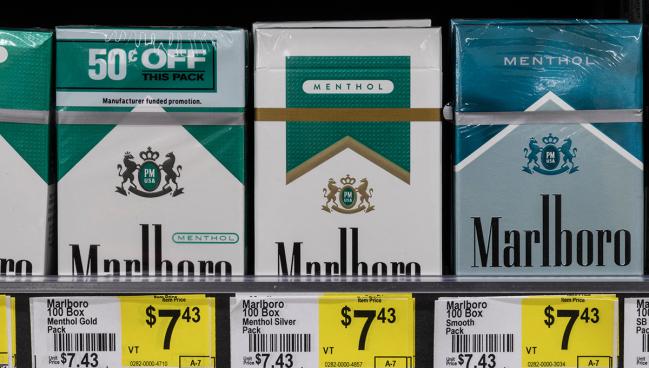FDA Proposes Ban on Menthol Cigarettes and Flavored Cigars
The ban will curb the appeal of smoking to young people and help promote greater health equity, says the FDA’s Robert Califf.

The US Food and Drug Administration has announced plans to ban menthol cigarettes and flavored cigars, an effort intended to reduce burden of tobacco-related disease and premature deaths. An public comment period on the proposed rules opens next week.
Menthol is added to cigarettes to reduce the harshness of cigarette smoke and to ease the irritation from nicotine. It’s known as a “characterizing flavor” and has been used by tobacco companies for its cooling and soothing effects to make smoking more palatable to new smokers.
“This proposed product standard would reduce the appeal of cigarettes, particularly to youth and young adults, and thereby decrease the likelihood that nonusers who would otherwise experiment with menthol cigarettes would progress to regular smoking,” according to the agency.
FDA Commissioner Robert Califf, MD, who spoke with media today about proposed ban, noted that roughly 50% of people who started smoking as young people began with menthol cigarettes. Menthol interacts with nicotine in the brain and is known to enhance nicotine’s addictive effects. Studies have also shown that youth menthol smokers smoke more frequently and are more physically dependent on nicotine than nonmenthol cigarette smokers, said Califf.
“Imagine if menthol cigarettes were no longer available in the US,” he said. “We know that the majority of smokers want to quit. Prohibiting menthol in cigarettes would mean over 18.5 million menthol cigarette smokers 12 years and older in the US would have a better shot at quitting. This translates to better health and a lower risk of premature death.”
Flavored Cigars (For the Kids)
In addition to banning menthol, the FDA intends to ban characterizing flavors, such as strawberry, grape, cocoa, and fruit punch, in cigars. These flavors increase the appeal of cigars and make them easier to use, particularly for adolescents and young adults. In 2009, the Tobacco Control Act banned flavored cigarettes other than those with menthol, but that ban didn’t apply to cigars.
“In 2019, more young adults tried a cigar for the first time than tried a cigarette for the first time,” said Califf. In the US, it’s estimated that more than 950,000 middle- and high-school students have smoked a cigar, cigarillo, or little cigar in the past 30 days, he added. “That’s a lot of young people smoking these products, and we know flavors play a big role in their use.”
The proposed regulatory bans, officially known as a new product standard, “would represent a public health victory,” according to Califf. It also represents an important step toward advancing health equity in the US, because Black smokers are much more likely than white smokers to use menthol cigarettes. Historically, tobacco companies have targeted Black individuals through advertising and culturally-relevant messaging for menthol cigarettes, according to the Centers for Disease Control and Prevention. Black smokers also experience the largest burden of tobacco-related death.
As a cardiologist, I have personally seen the devastating health effects of tobacco use, so I’m highly motivated for the FDA to help reduce the devastating personal toll caused by these products. Robert Califf
“Fundamentally, these bold actions are about saving hundreds of thousands of lives,” said Califf. “Each year, 480,000 lives are lost prematurely from a smoking-attributable disease, making tobacco the leading cause of preventable death and disease in the United States. As a cardiologist, I have personally seen the devastating health effects of tobacco use, so I’m highly motivated for the FDA to help reduce the devastating personal toll caused by these products.”
In statement, Nancy Brown, chief executive of the American Heart Association (AHA), said the tobacco industry has “relentlessly targeted communities of color, underserved populations, and youth with menthol products and other appealing flavors.” The proposed ban is a “momentous step” in the fight against heart disease, cancer, and other tobacco-related illnesses. These products, she said, are a public health menace and the AHA plans to work with the FDA to ensure the final regulations are “as strong and as comprehensive as possible.”
The American Medical Association (AMA) also is pleased with the proposed ban. “While long overdue, this rule, if finalized, will be a big step toward preventing a new generation from becoming addicted to tobacco products and suffering unnecessary harm, including death,” said AMA president Gerald Harmon in a statement.
The proposed product standards will be open for public comments on May 4, 2022, closing again July 5, 2022. The FDA will review these before its final decision. “The agency also will convene public listening sessions on June 13 and June 15 to expand direct engagement with the public, including affected communities,” a statement notes.
Michael O’Riordan is the Managing Editor for TCTMD. He completed his undergraduate degrees at Queen’s University in Kingston, ON, and…
Read Full BioSources
Food and Drug Administration. FDA proposes rules prohibiting menthol cigarettes and flavored cigars to prevent youth initiation, significantly reduce tobacco-related disease and death. Published and Accessed on: April 28, 2022.





Comments